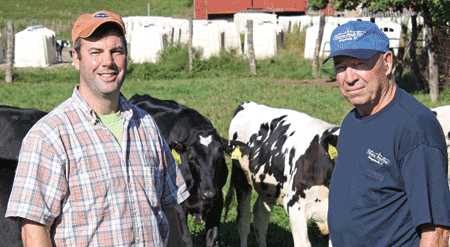
The Peck's Welcome Stock Farm, nestled in Schuylerville, N.Y., is quite unique among North American dairy herds as they bred not one, but two number one index bulls. While that may not be unique in itself, the fact those bulls were in two different breeds is certainly record setting. Welcome Choice Admiral, a once breed-leading Guernsey, had some 2,500 daughters in his USDA sire evaluation. Exactly two decades later, a Holstein, Welcome Garter-ET, topped the breed's index chart. In all, Garter has over 32,000 daughters in his evaluation.
While those two accomplishments are significant, the Welcome Stock herd is moving forward, fully embracing the recently minted genomics test. During the past two years, the herd has genomic tested a remarkable 346 heifers and cows. (The table to the right illustrates the difference in Net Merit for the 346 tested females at Welcome Stock Farms. For more discussion, turn to page 698). Over 100 young bulls bearing their herd's Welcome prefix also have been genomic tested with some 80 of their young sires pending progeny test evaluations in U.S. bull studs. This number doesn't include any young bulls sold as embryos to other countries.
Complimentary article: On-farm results and genetic theory go hand in hand
by Tom Lawlor, director of research and development with Holstein Association USA in Brattleboro, Vt.
There is nothing more convincing than to actually do something yourself. With 346 Holsteins having been genomic tested, the Peck Family of Schuylerville, N.Y., has first-hand knowledge of how close genetic theory and on-farm reality come together. (For more information on Peck's Welcome Stock genomic testing program, see page 693 .)
The genetic theory behind genomic testing is that we're now able to track pieces of DNA down through the generations and determine which animals received an above-average set of genes from its parents or a below-average set of genes. In other words, half of the offspring should be above parent average and half below.
At Peck's Welcome Stock Farm, that's exactly what you see when evaluating their 346 genomic tested females. They have a number of prominent cow families where both parents and their offspring have been genomic tested. One brood cow, Welcome Goldwyn Gracie, has been genomic tested along with all the bulls that served as mates, as well as 10 of their daughters. The average TPI value of these matings was 1,978.
In theory, the parents' average TPI should tell us the resulting TPI of the offspring. For Gracie, the 10 genomic-tested daughters averaged GTPI of 1,987 in August 2010. They're within 10 TPI points of one another, with five daughters being higher and five daughters being lower, indicating excellent agreement between the information on the parents and the genomic test results on the offspring.
What's really impressive is to see how well all 346 genomic tested animals match up with their traditional genetic evaluation. Depending upon their age, the traditional evaluation already includes pedigree information, a cow's own performance, and that of her offspring. Genomic information is just one more piece of data, helping us to get an earlier and more accurate prediction of an animal's genetic merit. If all calculations are being done correctly, then the addition of the new genomic information should cause half of the animals to go up and half of the animals to go down. To see the full distribution of the 346 animals that have been genomic tested, see chart below.











